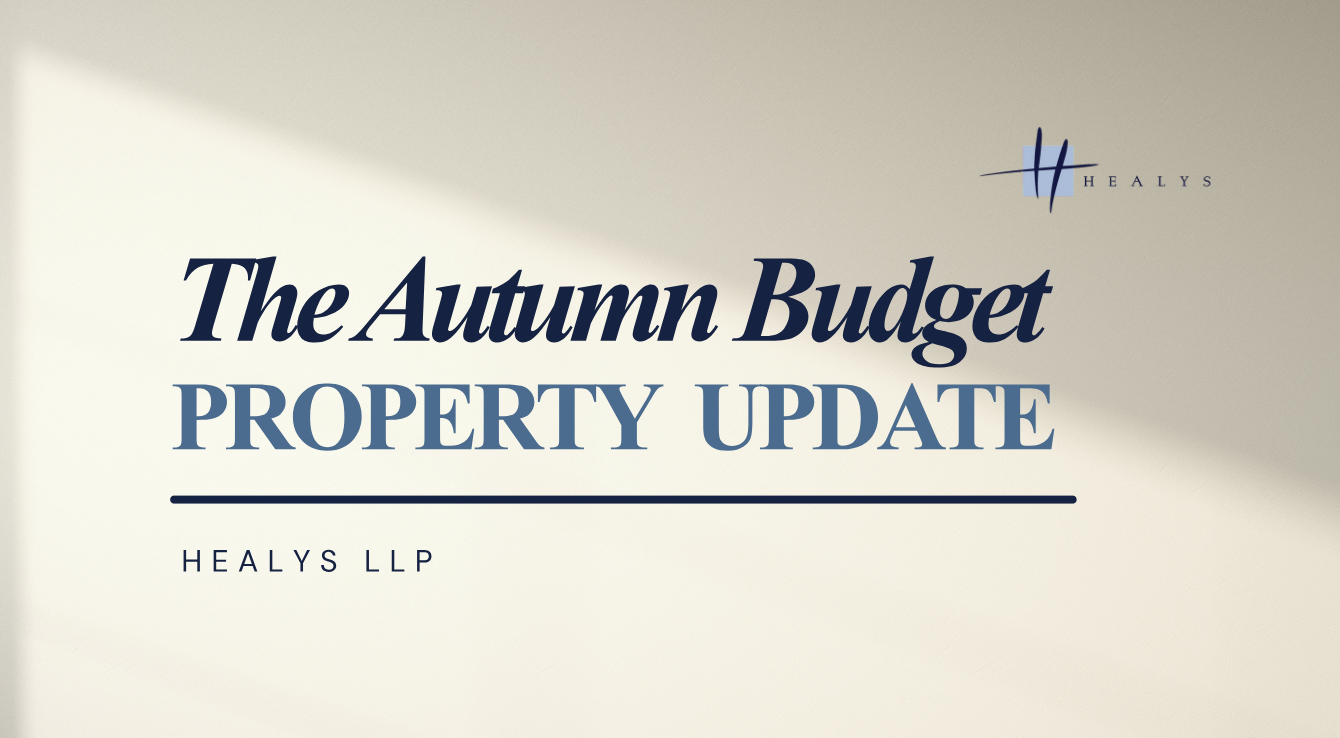Chancellor Rachel Reeves delivered the Autumn Budget on 26 November 2025 and the changes signal important and key updates for all property owners and landlords.
Head of Healys Real Estate, Kiri Kkoshi highlights everything you need to know.
Main Changes
1. Increase in tax on rental / property income
- From 6 April 2027, income tax on property (rental) income will increase by 2 percentage points across all tax bands. The new rates will be: 22% (basic), 42% (higher), 47% (additional).
- This tax rise comes on top of previous changes — notably the removal of full mortgage-interest relief, meaning many landlords already face tighter margins.
Effects:
- Net yields on rental properties will shrink, especially for landlords who hold properties in their personal names (rather than in limited companies).
- Many landlords may need to raise rents to maintain returns. Some estimates suggest this could add £20–£25/month to average rents
- Lower-yield or highly mortgaged properties may become uneconomic, prompting some landlords to exit the market (sell up) rather than accept poor returns.
2. New “High-Value Property” surcharge (so-called “mansion tax”)
- From April 2028, properties in England valued over £2 million will face an annual surcharge. The surcharge starts at £2,500/year for properties of £2–£2.5 m and rises to £7,500/year for properties over £5 million.
- This surcharge is levied on owners, not necessarily occupants — meaning both homeowners and landlords of high-value properties will be impacted.
Effects:
- Owners of prime properties (especially in London and the South East) will face higher ongoing holding costs.
- It may dampen demand for high-end properties, potentially softening the market for luxury homes — owners might reconsider holding on to such properties long-term.
- For landlords with expensive buy-to-lets or second homes above this threshold, holding costs rise — this may push them to offload properties.
3. Broader Context: Existing High Costs & Regulatory Pressure
Even before the Budget, landlords have seen a series of changes that squeezed returns:
- Mortgage interest relief was restricted / phased out — meaning mortgage interest is no longer fully deductible.
- Increased regulatory and compliance costs.
- Higher borrowing costs / interest rates post-2022 have dramatically increased mortgage servicing costs.
- The Budget’s new changes will likely compound pressure on profitability.
Likely Market Reactions & Broader Impacts
1. Reduced Rental Supply, Rising Rents
- Many smaller or less-profitable landlords — especially those with modest rental yields — may opt to exit the rental sector. This would reduce overall rental supply. With demand likely to remain the same or grow, reduced supply could push rents higher, increasing housing costs for tenants.
2. Shift in Landlord Profile — More Institutional / Ltd-Company Landlords
- Landlords with better capital, diversified portfolios, or companies might still find buy-to-let viable — especially if they structure ownership via a limited company (where corporation tax may remain more advantageous)
- Smaller individual landlords may increasingly sell, reducing the share of “mom-and-pop” landlords, and leaving the market to institutions or limited-company landlords.
3. Greater Financial Pressure — Risk to Investment Viability
- For landlords already highly leveraged (mortgage heavy) the increased tax, high interest and compliance costs may render investments economically unviable. Some may sell at a loss or carry, reducing overall property investor confidence.
- For landlords in high-value segments, the new surcharge substantially increases holding costs, which may push them to downsize or reassess their investment strategy.
What Landlords / Property Owners Should Do Now (Practical Advice)
- Re-run your cash flow forecasts: account for additional tax (from 2027) and the potential surcharge (if your property is high-value). If yields are already thin, assess whether holding the property still makes sense.
- Consider structuring via a company: For landlords with multiple properties or plans to expand, holding properties in a limited company may offer better tax efficiency over the long term.
- Check property values: If you own high-value housing (estate greater than £2 m) be aware the surcharge will apply from 2028. Plan your budget accordingly.
- Review exit strategies: For marginal investments, or properties needing major maintenance / investment, it may now be more viable to sell rather than continue absorbing costs.
- Communicate with tenants if raising rent: If you pass on increased costs, be mindful of regulatory, reputational and affordability issues.
Broad Risk to Rental Market & Housing Supply
- Economists and industry groups warn that these changes, especially when combined with existing pressures (interest rates, compliance costs, prior tax reforms), could lead to a reduction in the supply of private rental dwellings. This may drive rents higher and make housing less affordable for many, worsening housing shortages and placing pressure on social housing or other alternatives.
- For landlords, it means the return on buy-to-let investments will shrink; and for many, the model may no longer make sense without rental increases, restructuring, or a transition to company ownership.

